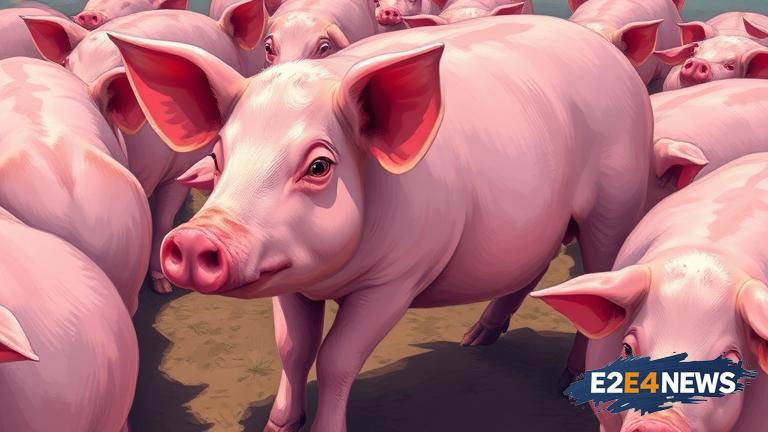The US pork industry is facing a significant challenge with the implementation of Proposition 12, a California law that sets new standards for animal welfare in the state. The law, which was passed in 2018, requires that pigs, egg-laying hens, and veal calves have a minimum amount of space to move around in their enclosures. The pork industry has been vocal in its opposition to the law, arguing that it will lead to increased costs and reduced competitiveness. The National Pork Producers Council (NPPC) has been at the forefront of the opposition, arguing that the law is unconstitutional and will have a devastating impact on the industry. The NPPC has pointed out that the law will require significant changes to the way that pigs are raised, including the use of larger enclosures and more space per animal. This, the NPPC argues, will lead to increased costs for farmers and ultimately higher prices for consumers. The pork industry has also argued that the law will lead to a reduction in the number of pigs being raised in the state, which will have a negative impact on the economy. Despite the opposition from the pork industry, supporters of the law argue that it is necessary to improve animal welfare standards. They point out that the current conditions in which pigs are raised are inhumane and that the law will help to reduce animal suffering. The law has also been supported by animal welfare groups, who argue that it is a step in the right direction towards improving the treatment of animals in the agricultural industry. The controversy surrounding Proposition 12 has sparked a heated debate over the balance between animal welfare and the economic interests of the pork industry. The law has also raised questions about the role of state governments in regulating agricultural practices. Some have argued that the law is an overreach of state authority and that it will lead to a patchwork of different regulations across the country. Others have argued that the law is a necessary step towards improving animal welfare standards and that it will have a positive impact on the industry in the long run. The implementation of Proposition 12 has also raised questions about the impact on international trade. The US pork industry is a significant exporter of pork products, and the law has raised concerns about the potential impact on trade agreements. The NPPC has argued that the law will make it more difficult for US pork producers to compete in the global market. Despite the challenges posed by Proposition 12, some farmers are already making changes to their operations to comply with the law. These farmers are investing in new enclosures and equipment to provide more space for their animals. The law has also sparked innovation in the industry, with some companies developing new technologies to improve animal welfare standards. However, the majority of the pork industry remains opposed to the law, and the controversy is likely to continue in the coming months. The US pork industry is a significant contributor to the country’s agricultural sector, and the impact of Proposition 12 will be closely watched by industry stakeholders and animal welfare groups. The law has also raised questions about the future of the pork industry and the potential for similar laws to be passed in other states. As the debate over Proposition 12 continues, it is clear that the law will have a significant impact on the US pork industry and the wider agricultural sector. The law has sparked a necessary conversation about animal welfare standards and the balance between economic interests and animal welfare. Ultimately, the implementation of Proposition 12 will depend on the outcome of the ongoing legal challenges and the willingness of the pork industry to adapt to the new regulations.
